Contents
- Traditional Sports
- Gilli Danda
- Blind Salad
- Labad Lumbad or Lame
- Dhappa
- Kancha
- Sat Palani
- Chor-Police
- Tire with a Stick
- Aaich Patra Haravl
- Talaat Malaat
- Bhavra
- Carrom
- Raja Mantri Chor Sipahi
- Competitive Sports
- Kabaddi
- Cricket
- Volleyball
- Basketball
- Football
- Softball
- Sports Connected with Festivals or Nature
- Mangalagaur Phugdi
- Bullock Cart Racing
- Kite Flying during Makar Sankranti
- Traditional Wrestling Matches (Kushti) during Fairs
- Famous Sports Personalities
- Shital Mahajan
- Jayesh Vikas Mahajan
- Pranav Wagh
- Sports Infrastructure
- Chhatrapati Shivaji Maharaj Stadium, Jalgaon
- Outdoor Exercise
JALGAON
Sports & Games
Last updated on 22 July 2025. Help us improve the information on this page by clicking on suggest edits or writing to us.
In Jalgaon district, people participate in a wide variety of sports and games that serve multiple purposes. Many traditional and modern sports can be classified as indoor and outdoor games, such as Gilli Danda, Cricket, Raja Mantri Chor Sipahi, Carrom, etc. Among all, people have been liking Softball more lately.
Let’s take a closer look at the different types of games and sports that have been traditionally played in our district. We will explore their origins, the cultural significance they hold, and how they have evolved over the years. By tracing the history of these activities, we can gain insights into how they have developed and adapted to changes in society, technology, and lifestyle.
We will also examine how these sports reflect the values and traditions of the community. For instance, some games may emphasise cooperation and collaboration, while others may focus on individual achievement and competition. Understanding these aspects will help us appreciate not just the physical activity involved but also the social and cultural dimensions of sports in our district.
Additionally, we will look at how modern influences have transformed traditional games. This includes the introduction of new rules, variations in gameplay, and the impact of global sports trends. By studying these changes, we can better understand the dynamic nature of sports and how they continue to shape our community today.
Traditional Sports
Gilli Danda
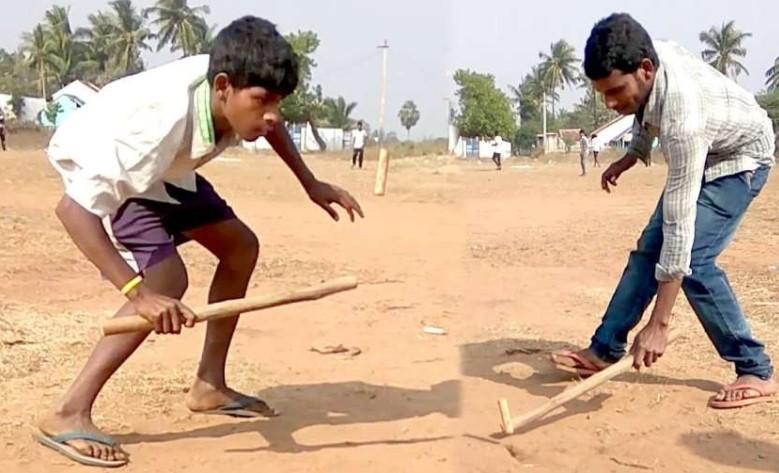
Gilli Danda is one of the traditional games, native to India, especially in rural areas. It is played with two main pieces of equipment: the Gilli and the Danda. The Gilli is a short bamboo stick that is thinner at both ends, while the Danda is longer than the Gilli. In the game, one player holds the Gilli in the air with the Danda and tries to hit it as far as possible. When the Gilli falls to the ground, the opposing player tries to catch it before it lands and then immediately attempts to knock it away.
Blind Salad
Blind Salad is a traditional game, and children are usually most fond of it. In this game, one of the players is selected to be ‘the blind’ and they have to keep their eyes closed while trying to tag the other players. The other players try to avoid being tagged and move around to escape from the player who is ‘the blind’, they shake, and try to confuse by shouting randomly in intervals. In case someone gets caught, that person becomes ‘the new blind’ and the game has to begin all over. This game helps kids develop their physical skills, balance when they hit something suddenly and listening skills. It’s also a great way to have fun with friends and celebrate together.
Labad Lumbad or Lame
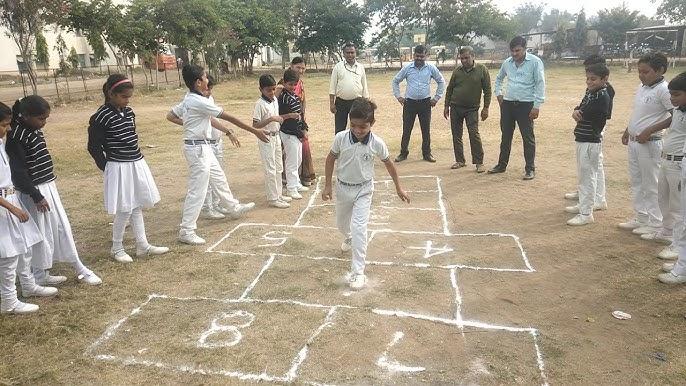
Labad Lumbad (or Lame) is a popular game played by young people. In this game, boxes are drawn on the ground, and players have to jump through them in a specific order. The player jumps off one leg while balancing on the other. The usual way to play is to start at the first square and then jump to the next square one at a time. Players must move forward without touching the stones or stepping on the lines. If someone makes a mistake, they are out, and the next player takes their turn. This game has the benefits of forcing the player's physical ability, the ability to balance and coordinate, and sharpening their concentration. It is famous in many places in India and occupies a significant place among games for children, boys and girls equally.
Dhappa
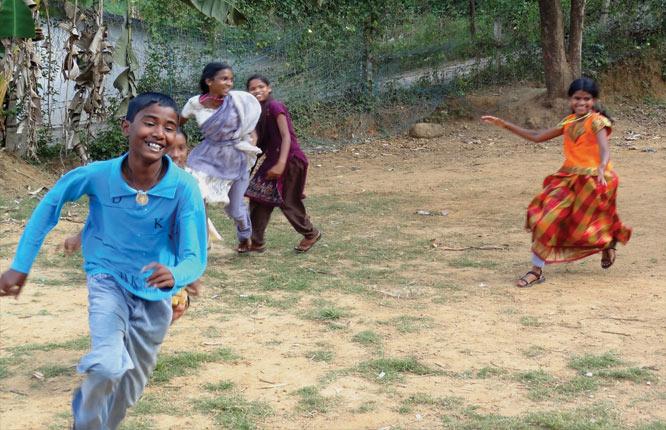
Dhappa, also known as catch-catch, is a popular game that children love to play. In this game, one player takes on the role of the "Dhappa," whose goal is to catch the other players. When a player successfully catches the Dhappa, they switch roles and become the new Dhappa, and the game starts over. To play Dhappa, you need a large open space where kids can run around and avoid touching the ground. This game encourages physical movement and helps improve running skills and fitness. It also improves children's quick thinking and the way they reason with the issue at hand and act on it. Playing Dhappa is a lot of fun because it is exciting, especially when played with friends. This game is usually played in school yards or parks, and it helps build friendships among children.
Kancha
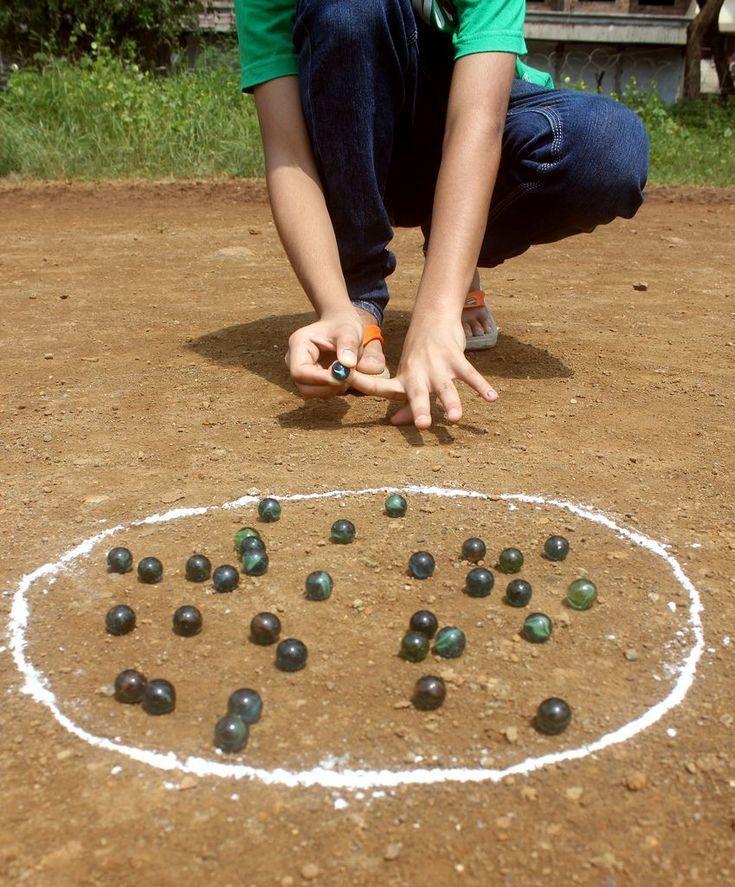
Kancha or Gotya is a traditional Indian game that children still enjoy today. The game is played with small glass or clay balls. Players try to hit balls from a certain distance and knock them out of the playing area. The goal of the game is for a player to aim at a set of dots placed on the ground and hit them with their balls. The player who scores the most points wins. Players use their thumbs and fingers to shoot the balls, and they learn proper shooting techniques through practice. Kancha is best played on a smooth, open surface. This game helps children develop their motor skills and hand-eye coordination. As an outdoor sport, it brings a lot of fun and excitement when played with friends. Kancha is still played in various regions of India and holds an important place among children's games and sports.
Sat Palani
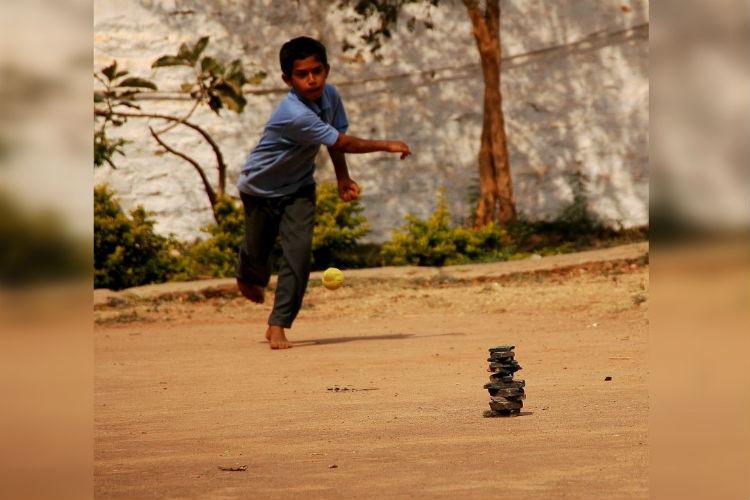
Sat Palani (or Lagori) is a popular outdoor folk game, especially in rural areas. It involves two teams: one throws a ball to knock down a stack of seven bricks, which is called Pithi, while the other team tries to rebuild the stack without being hit by the ball. The game promotes teamwork, balance, and cooperation. The team that successfully rebuilds the bricks wins.
Chor-Police
Chor-Police is a popular outdoor game played by kids, especially in rural areas. The game has two teams: "thieves" and "police." The thieves try to escape and reach their base, while the police try to catch them and bring them to their base. Thieves must use agility to avoid capture, and the game is governed by rules such as getting caught or crossing the police base. The team that catches the most thieves or stops all thieves from reaching their base wins. The game helps improve agility, courage, teamwork, and encourages physical and mental activity.
Tire with a Stick
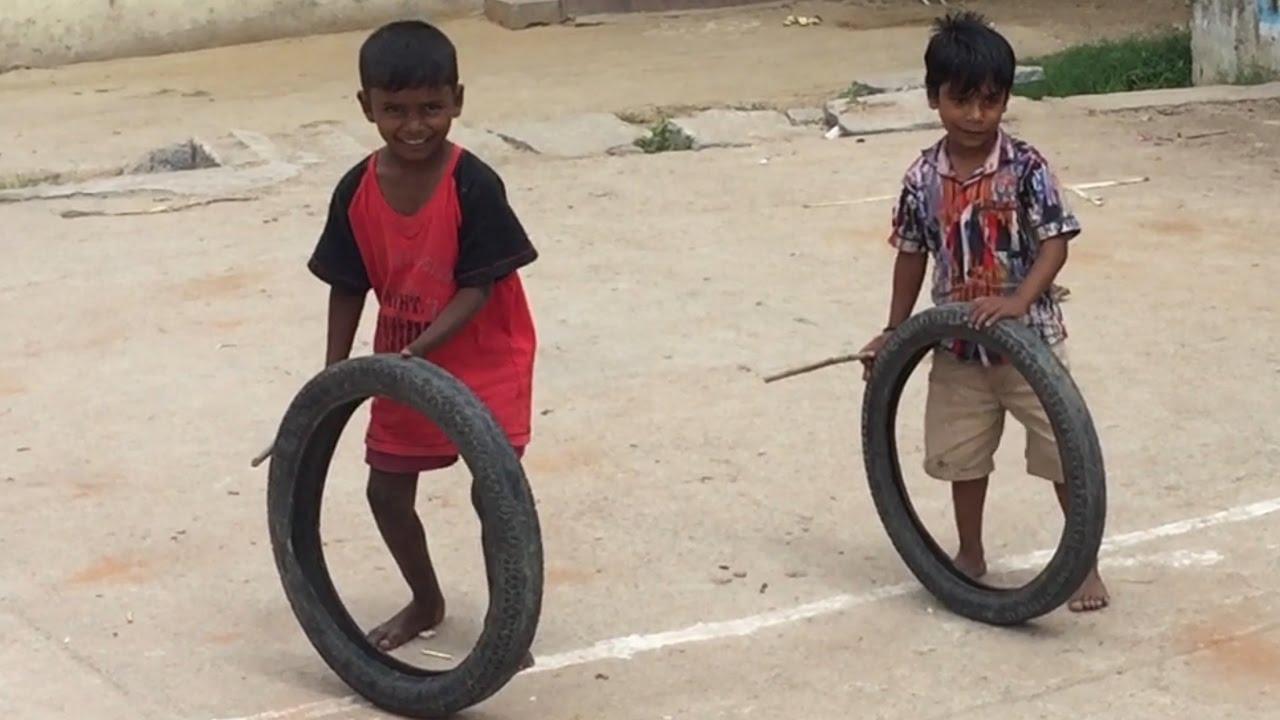
As the name suggests, in Tire with a stick, a tire and a stick are used. The player places the tire on a flat surface and uses the stick to push it, aiming to keep it moving steadily over a long distance. The goal is to control the tire while avoiding obstacles. This game helps improve agility, coordination, and balance. It also includes challenges, like racing to cover distances quickly. The game enhances physical skills and provides fun for children.
Aaich Patra Haravl
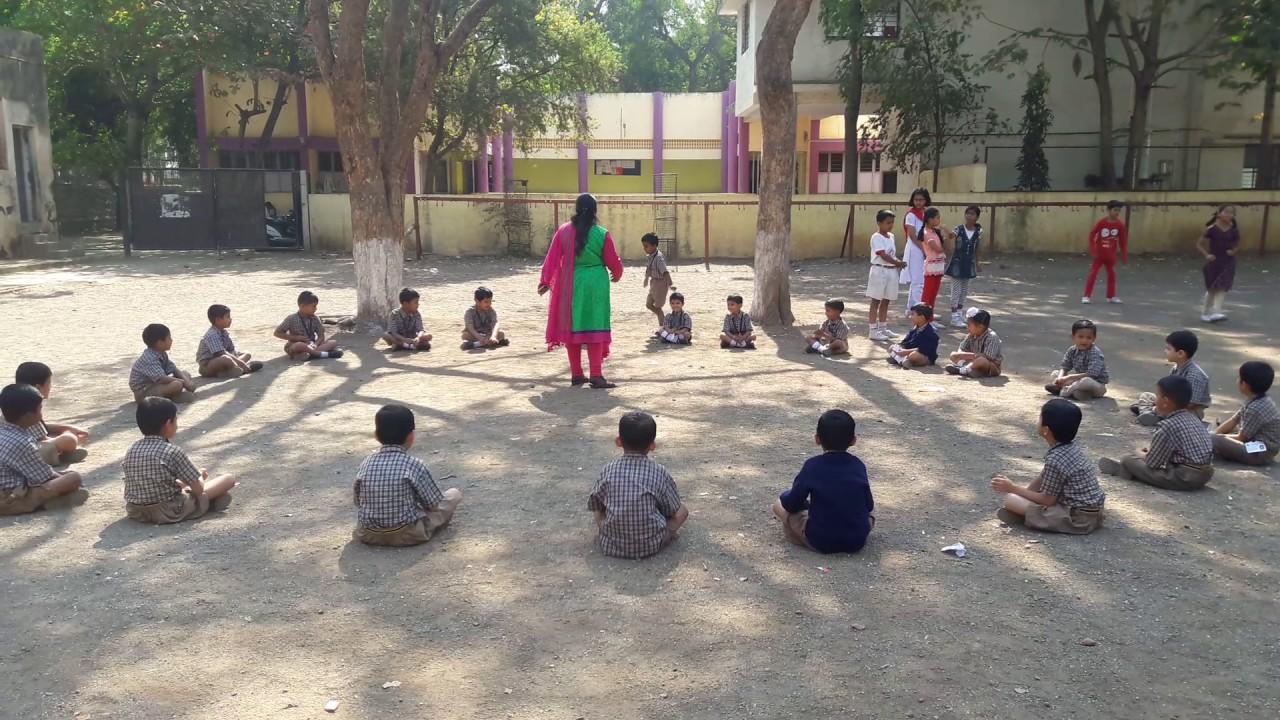
Aaich Patra Haravl (Mother’s letter is lost) is a traditional game often played in schools and rural areas. Players sit in a circle while one player runs around holding an object, singing "Mother's letter lost, who found it?" The player secretly places the object behind someone. The person who finds it must get up and try to grab the object, while the runner returns to the circle. If the finder catches the runner, they win; if not, the runner keeps the object and the game continues. The game helps develop agility, coordination, and a sense of teamwork.
Talaat Malaat
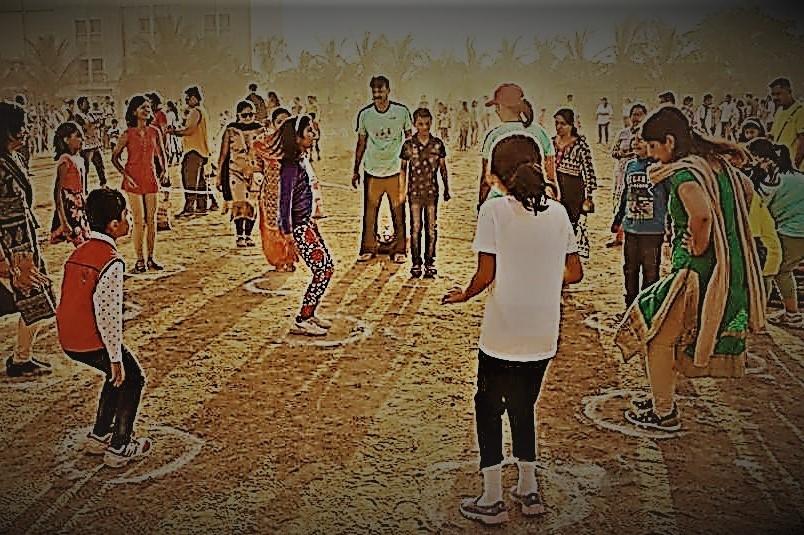
Talaat Malaat is a popular traditional game played mostly in rural areas and schools. (Source: CKA Archives).
Talaat Malaat is a popular traditional game played mostly in rural areas and schools. Players form a large circle, and one player, called the "director," stands outside. The director must enter the circle, perform a fun activity, or try to catch other players while the group sings the song "Talaat Malaat." Everyone makes funny movements with their heads, feet, and hands to the rhythm of the song. The goal is to catch as many players as possible while having fun and working together. The game encourages agility, coordination, teamwork, and physical activity, while also bringing joy and a sense of community.
Bhavra
Bhavra is an old game with a history dating back to the time of Shivaji Maharaj. Children in Jalgaon especially enjoy playing it during the summer. The game uses a triangular spinning top called Bhavra, which has notches for a rope. When the rope is wrapped around the toy and pulled, it spins on the ground. Kids have found creative ways to play, such as spinning it with their hands or pulling it along the ground. Some people believe the game is connected to the Earth's rotation.
Carrom

Carrom is a popular indoor game in rural India, usually played by four players or two pairs. The game is played on a square wooden board with raised edges, featuring four corner holes and a central circle. The game pieces include nine white, nine black, and one red piece (the queen). Players take turns trying to pocket their pieces using a striker. The queen earns extra points but must be followed by pocketing another piece, or it is returned to the centre. The goal is to score as many points as possible by pocketing all the pieces. Carrom tests skill, focus, and dexterity. It brings families and friends together, promoting interaction, friendship, and cooperation, making it an important part of rural culture
Raja Mantri Chor Sipahi
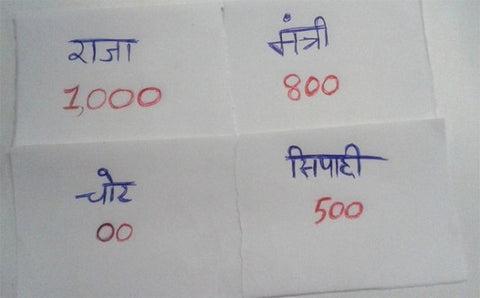
Raja Mantri Chor Sipahi is a popular game among rural children, played by four players who take on the roles of king, minister, thief, and soldier. The game starts by drawing cards labelled with these roles, which are shuffled and given to each player without revealing them. The king asks, "Who is the king?" and the minister responds. The minister then tries to guess who the thief is. If the minister guesses correctly, they earn 150 points, and the thief is caught. If wrong, the thief gets 100 points. The soldier gets 50 points, and the king earns 200 points. Each new round starts with shuffled cards.
Competitive Sports
Kabaddi
Jalgaon district in northern Maharashtra is well-known for its strong Kabaddi culture. The sport has a deep-rooted history in the area and remains highly popular among locals. Kabaddi is passed down through generations, and various school, district, and state-level competitions promote its popularity. Inter-school competitions inspire students, and district-level events give local players a chance to showcase their talent. Many Kabaddi clubs and training centres in the district help young athletes develop their skills by offering coaching, physical training, and equipment. The district encourages athletes to compete nationally and internationally, and local sports facilities are being improved. Both government and private initiatives are working to promote Kabaddi, including the development of modern venues and awards. As a result, Kabaddi is rapidly growing in Jalgaon, and the district is recognised for its significant contribution to sports.
Cricket
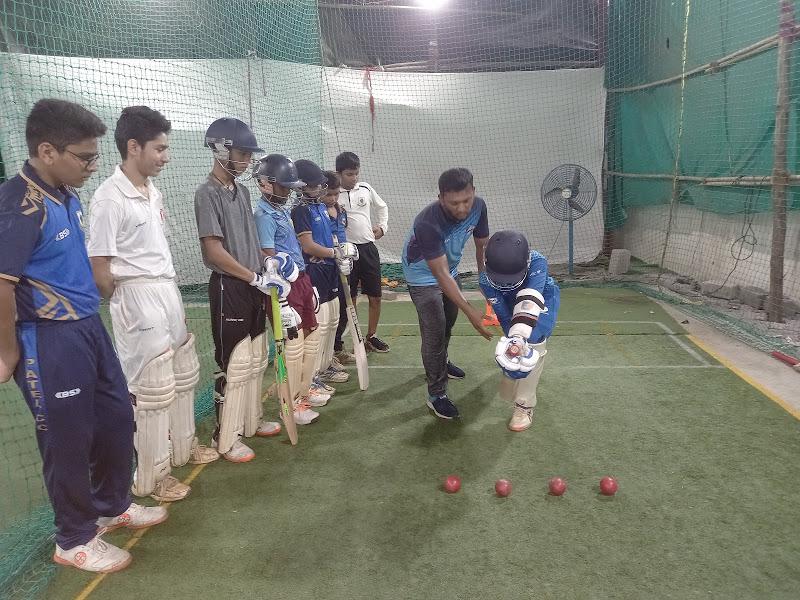
The growing love for cricket has led to an increase in the number of players. Many cricket clubs, academies, and teams in the district help develop the skills of local cricketers. School and college-level tournaments provide young players with opportunities to showcase their talent. Local and district-level matches are held at various grounds, improving the quality and competitiveness of the game. Cricket academies offer specialised training, skill development, and modern coaching techniques. Both the government and private sectors support cricket through better facilities, player training, and organising events.
Volleyball
Volleyball has become more popular in Jalgaon district, enhancing the local sports culture. It is widely played in both rural and urban areas, with regular competitions and tournaments held. Volleyball clubs and training centres are helping develop the skills of young players and boosting the sport's popularity.
Basketball
Basketball is growing rapidly in the district, with school and college tournaments offering young players a chance to excel. Modern facilities and trained coaches help develop local talent. Basketball clubs and academies provide specialised technical and physical training to players.
Football
Football is popular among the youth in the district, with many teams competing in school and district tournaments. Football academies and clubs help young players improve their skills. Modern facilities are available, and local players are encouraged to compete at national and international levels.
Softball
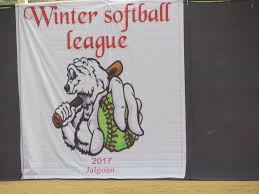
Several factors contribute to the rise of this sport in the region. The District Sports Office organises tournaments that support local talent and bring the community together. Schools have started including softball in their sports activities, which gets younger students interested. And Maharashtra government's support, particularly through improved sports facilities like the Jalgaon District Sports Complex, has helped promote softball alongside other sports. The community's strong involvement in softball events has further boosted the sport's popularity, making it accessible and enjoyable for people of all ages.
Sports Connected with Festivals or Nature
In Jalgaon district, sports and traditional games are often connected to local festivals and nature-based activities.
Mangalagaur Phugdi
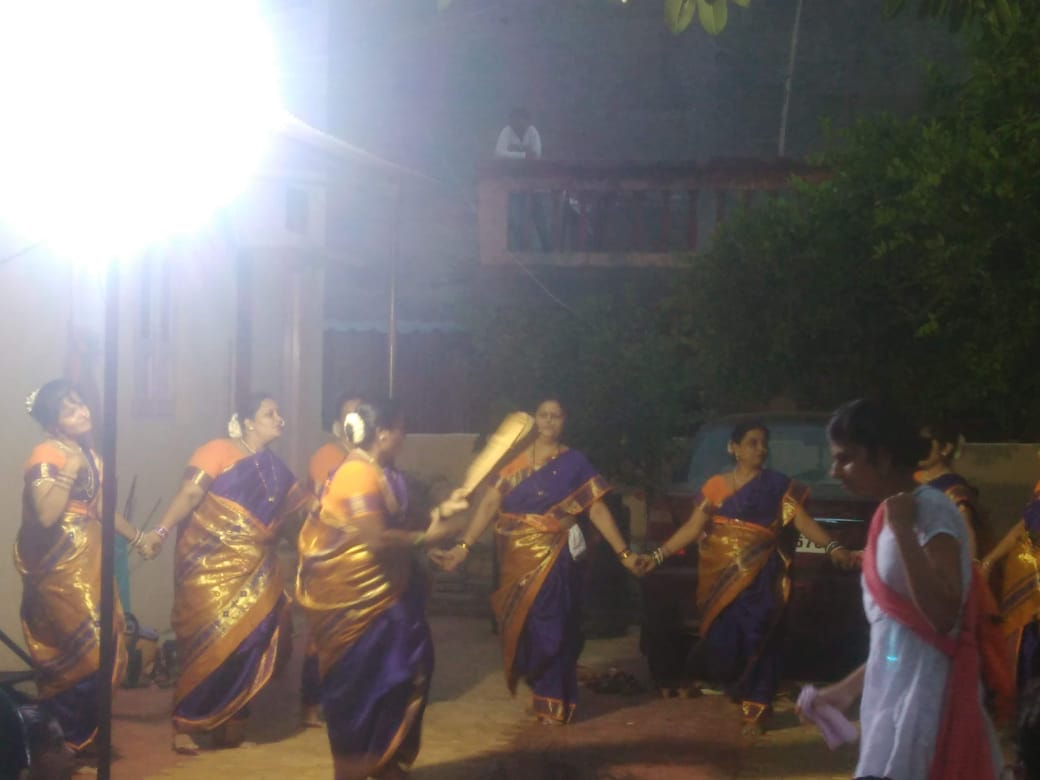
Mangalagaur is a festival celebrated by newly married women, and it involves playing traditional games like Phugdi and Jhimma. Phugdi involves two women holding hands and rotating around each other, while Jhimma is a rhythmic clapping game. These games are played during the night of Mangalagaur and are a way of celebrating marital happiness and bonding among women.
Bullock Cart Racing
During certain village fairs and festivals, bullock cart racing is organised in rural areas of Jalgaon. This traditional sport is deeply connected to the agricultural lifestyle and is a way to celebrate the harvest and other significant occasions.
Kite Flying during Makar Sankranti
Kite flying is a popular activity during the festival of Makar Sankranti in Jalgaon, as in many parts of India. The festival marks the transition of the sun into the zodiac sign of Capricorn and is celebrated with enthusiasm. The skies are filled with colourful kites, and it becomes a sport where people compete to cut each other's kites.
Traditional Wrestling Matches (Kushti) during Fairs
Traditional wrestling is often organised during local fairs, Jatras, and festivals in Jalgaon. These matches are held in mud arenas (Akhadas) and attract large crowds. The wrestlers demonstrate their strength and skill, and these events are a major attraction during the fairs.
Famous Sports Personalities
Shital Mahajan
Shital Mahajan Rane, born in Jalgaon, is a renowned extreme sportsperson and skydiver. She holds eight world records, including being the first woman to perform a free-fall jump over Antarctica and the youngest to jump over both the North and South Poles. Shital has completed 766 jumps and is the founder of the Phoenix Skydiving Academy in Pune. She has received several awards, including the Padma Shri in 2011. Her achievements inspire many, especially young girls, to pursue adventurous sports.
Jayesh Vikas Mahajan
Jayesh Vikas Mahajan, born on July 30, 2004, in Deogaon Village, Jalgaon District, is a talented kabaddi player. He began playing kabaddi at age 10 and now represents the Nandurbar team in the KMP YKS 2024 tournament as a Right Corner Defender. His passion for the sport is inspired by his father, a cotton farmer, and his favourite player, Girish Ernak. Jayesh trained at Baramati Sport Academy under mentors like Yogesh Bari and Kamlesh Patil. He has won Bronze medals in the Khelo India U18 tournaments in 2022 and 2023 and excelled in the Junior National of 2024. Currently pursuing his B.Sc., Jayesh dreams of representing Junior India and playing in the Pro Kabaddi league.
Pranav Wagh
Pranav Wagh is a renowned Taekwondo player from Jalgaon district, known for his skill and excellence in the sport. He began his training at a local Taekwondo centre in Jalgaon, where he received strong guidance from his coaches and mastered the techniques through hard work and dedication. Pranav has competed in several state, national, and international events, winning many gold and silver medals, particularly at the state and national levels. His success has made him a role model for Taekwondo in the district. His achievements have inspired many young players and raised the profile of Jalgaon in Taekwondo, significantly contributing to the sport's growth and recognition in the area.
Sports Infrastructure
Chhatrapati Shivaji Maharaj Stadium, Jalgaon
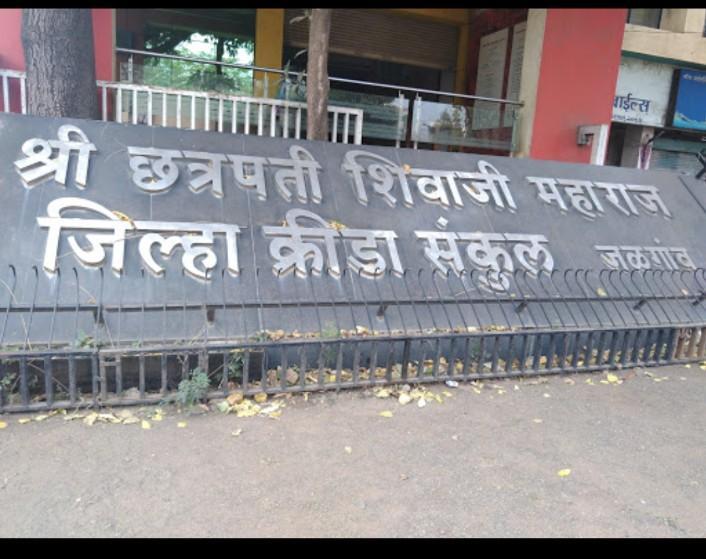
The Chhatrapati Shivaji Maharaj Stadium in Jalgaon is a cricket stadium. It was inaugurated in 1990. The stadium serves as a venue for domestic cricket matches and has also hosted various local tournaments. It was built to promote cricket in the area and is named after the Maratha king, Chhatrapati Shivaji Maharaj.
Other sports facilities include the Mahatma Gandhi District Sports Complex with a stadium for athletics and cricket, the Jalgaon Municipal Corporation Sports Complex for indoor and outdoor games like badminton and basketball, Shastri Nagar Sports Ground for football and athletics, Shivram Seth Gindodiya Indoor Stadium for badminton and table tennis, Jalgaon Gymkhana Club with tennis, swimming, and gym amenities, and the Khandesh Sports Academy providing training in cricket, football, and athletics.
Outdoor Exercise
Morning walks are popular in Jalgaon, especially in parks and open spaces like the Mahatma Gandhi District Sports Complex, where residents walk for fitness and relaxation. Adventure lovers enjoy trekking in spots known for their scenic trails and natural beauty.
Yoga and meditation are practised at local centres and public spaces. Notable places include Yoga Shala, which offers classes, and public parks like those near the Jalgaon Municipal Corporation Sports Complex.
Last updated on 22 July 2025. Help us improve the information on this page by clicking on suggest edits or writing to us.